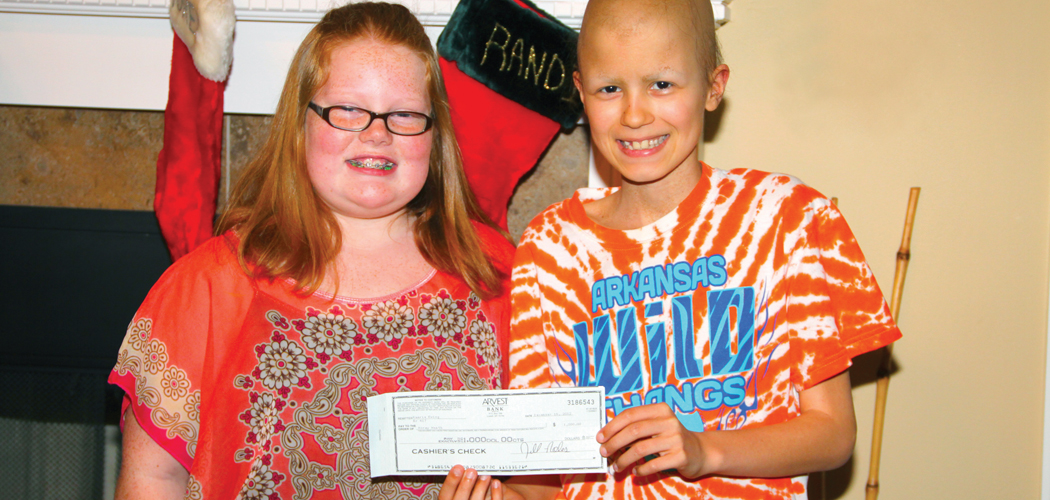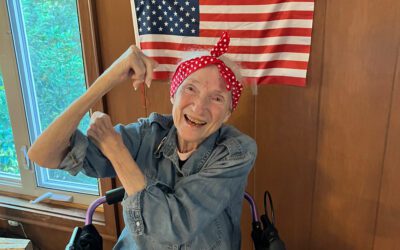[title subtitle=”words: Marla Cantrell
Images: Courtesy Melanie Ewing”][/title]
Kamrie was nominated as a Do South Do-Gooder by Christie Reams
On a sweltering day much like this one, Melanie Ewing, of Dover, Arkansas, was brainstorming about how to keep her kids entertained until school began. It was July, 2012, and her teenage son, the oldest, was fairly busy with baseball. But her nine-year-old daughter, Kamrie, was running out of things to do. What Kamrie wanted at the time was a new bicycle, and Melanie thought she could convince her to make ponytail holders in her idle hours that she could sell to close friends and family.
The idea wasn’t so much about how much money her daughter would make, or even about the bike she’d be helping to buy. It was about the project, focusing on something, and meeting a goal. When she presented the proposal to Kamrie, she said she didn’t want a bike at all. What she wanted, she told her mom, was to help orphans.
The problem was, in the small town of Dover (population 1,378), neither Kamrie nor Melanie knew any orphans. She had heard, however, about an eleven-year-old girl who was fighting cancer, and lived nearby in Russellville. Kamrie decided she’d make the ponytail holders and give the money to her.
And so the plan took form. Melanie and Kamrie went to Hobby Lobby with their half-off coupon in hand, stocked up on supplies, mainly spools of patterned ribbons that were cut into different lengths and then tied to the ponytail holders. Kamrie furrows her brow, trying to remember how long one of her creations took to make. “About a minute or two, I think.”
Even if it was only a minute, those minutes began to collect, turning into half hours, and then hours, and finally days. Kamrie’s Colorful Creations (as she came to call her venture and now non-profit organization) was a big hit, in part because of their price — they cost three or four dollars. And partly because Kamrie got a big stick, wrapped it with the brightly colored ponytail holders and took them to her brother’s baseball tournaments and set up shop.
“I remember at one of my brother’s games, I was selling so many so fast, I was having to sit on the money” — Kamrie points to her thigh — “I’d just stick it under here and keep selling. It was so chaotic.”
Kamrie is a fireball of a girl: shiny red hair, freckles, braces, blue eyeglasses, toenails painted orange and blue. She gestures a lot: pointing, running her fingers through her long hair, throwing her arms around herself when she talks about how much she loves something, like her dogs, for example, or the cookies she makes with her grandmother, and apparently selling things.
As she’s talking, she is smiling, bright as the morning sun, and the orange bands on her braces show. “That one night, the first Friday, I made $100. I couldn’t believe it.” And then her eyes grow wide. “And after about six weeks, the very first day of fourth grade, I’d raised $1,000!”
Melanie remembers the joy of taking the money to the eleven-year-old. It was the first time the girls had met. After the visit, as Melanie was pulling out of the driveway, Kamrie said, teary-eyed, “I want to do this again. I want to give her another $1,000.”
For Melanie, it meant that she would be doing a lot of rescheduling. She has a photography studio, and works by appointment. She began spending more and more time helping Kamrie, particularly selling the ponytail holders at craft shows and festivals. Places, like Harley Davidson in Conway, let them set up a booth on certain days. Everywhere they went, people were moved by this little dynamo and her dream of helping a girl she barely knew.
Melanie remembers the day they hit the $2,000 mark. It was a Wednesday in December. She remembers thinking what a great thing Kamrie had done, and she remembers thinking, Now, this is over.
But then Sunday came, and the family drove to The Journey Church in Russellville. Their pastor was asking for donations for Christmas, for Southern Christian Home, a home for orphaned, neglected and dependent children, which is in Morrilton, only about thirty minutes away. Melanie remembers the feeling of hearing the word “orphaned.” Tears fell, she felt a lump in her throat. Helping orphans was Kamrie’s original goal. “I knew we weren’t done then,” she says.
“When we got home, Kamrie said, ‘I want to raise a hundred dollars for those kids.’ There were forty-nine kids there. I’d lived here my whole life,” Melanie says, “and I’d never heard about this place.” Melanie shakes her head, awed still at what happened that day. “It was totally God, I’m sure of it.”
Melanie and Kamrie needed to come up with a fast moneymaker. Melanie’s friend, a fourth grade teacher in Fayetteville, had sent her a link to a craft project that took paper clips and ribbon and turned them into bookmarks. There was a lot of scrap ribbon left over from the ponytail holders, so the project would cost very little. They asked for sponsors, via a Facebook post, to donate $20 for a teacher they wanted to help, and then Kamrie and Melanie would make bookmarks for all the kids in that class. They would deliver them before the holiday break, which was slated to begin at the end of the following week.
The problem with posting on Facebook is that you never know just how far your message will go. By the time they went to bed on that Sunday night, they had ten sponsors. By Wednesday, they had fifty-two, and by Friday there were 106 in four different states: Arkansas, Iowa, California, Ohio. That meant well over 2,000 bookmarks, something Melanie knew they’d never be able to pull off. So, Melanie put on a plea for volunteers, and the very next day twenty-seven helpers showed up at The Journey Church to assemble the bookmarks.
One of the best things that came out of this project was Melanie finding out that her friend who sent her the idea for the bookmarks was married to a man who grew up at Southern Christian Home. She said to me, ‘He told me he would not be the devout Christian man he is today if he hadn’t grown up there.’”
Again, Melanie brings up God. Call it coincidence, serendipity, whatever you want, but when Melanie heard those words, she felt sure God was at work, once again, in her life and in Kamrie’s.
In six days, they raised more than $2,000 for the home. Kamrie’s family went there, met the kids, and gave them the money. Kamrie made friends, and she’s been back several times. “I could feel the love in that place,” Melanie says. “They have several house parents, and those kids have a family with them… They help them with their homework every night, they feed them, they take them to the dentist. One little boy, about three, had long curls and he was kind of shy, and he had his little arms wrapped around his dad’s legs. I remember that dad, who’s not his biological dad, putting his hand on the boy’s head. It was such an affectionate moment.”
Since that time, Kamrie’s projects have included getting new shoes for some of the students at Dover schools, gathering backpacks for foster kids who often have to keep their possessions in garbage bags when they’re moved from one home to another. And on June 14, she held Kamrie’s Pooch Palooza, a dog show in Russellville to raise money for the schoolchildren affected by the deadly tornado that devastated Vilonia and Mayflower on April 27.
Everywhere she looks, Kamrie sees opportunities to help. And she is one of the best salespeople you’ll ever meet. While at Starbucks in Russellville on this Saturday morning, she sits beneath a canopy, shielded from the rain, and sells her signature T-shirts to the early morning crowd. “They’re only five dollars,” she says, “and we need to get rid of them.”
Once the customer is lured in, she tells them about her mission to help kids, and mentions the dog show. “One lady donated sixty dollars,” she says, “and now her dog’s entered in four categories in the Pooch Palooza! Isn’t that great?” she asks.
Before her mom can answer, another customer walks up. He is a silver-haired gentleman, dressed in a paint splattered T-shirt and shorts. It’s likely a workday for him, but he’s curious enough to stop and chat. When he hears what Kamrie’s doing, he says, “Sounds to me like you got your mind made up. Your foot’s on the rock. You ever heard that song?” he asks. “It’s a good gospel song. I’m gonna give you a donation. The Bible tells us it don’t take many to do wonderful things, it just takes a few. You hang in there.”
“I will,” Kamrie says, and then the man continues. “I’m assistant pastor of Community Church in Tennessee. When I go home, I’ll tell them about you. Six hundred miles away kids will know about you.”
Kamrie is beaming. She hands over two of her wristbands to the man, multi-colored rubber bracelets with the message, “Just one.” The line came from the sermon her pastor preached on the day she learned about Southern Christian Home. He was quoting Mother Teresa who said, “If you can’t feed a hundred, feed just one.” Kamrie tweaked it a little. She says, “If you can’t help a hundred kids, help just one.”
That’s how it all started with Kamrie. She found one girl who was battling cancer, and that young girl was surprised that someone she didn’t know would do so much for her, would do everything she could to make her life a little easier at such a hard time.
Kamrie saw her recently. “She has hair now!” Kamrie says. Melanie breaks in, “We heard she’s gotten a really good report, she’s doing really well.”
At eleven years old, Kamrie has already raised more than $15,000 to help kids in our area. In the process, she’s discovered something some of us never learn: To get joy, you have to give joy. And so she does, every chance she gets, every time she sees a way to make the world a better place to call home.
[separator type=”thin”]
For more on Kamrie’s mission, visit kamriescolorfulcreations.org




